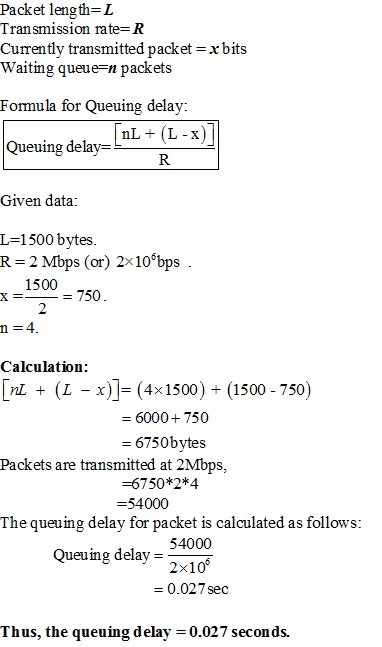
 Question
Question
A packet switch receives a packet and determines the outbound link to which
the packet should be forwarded. When the packet arrives, one other packet is halfway done being transmitted on this outbound link and four other packets are waiting to be transmitted. Packets are transmitted in order of arrival.
Suppose all packets are 1,500 bytes and the link rate is 2 Mbps. What is the queuing delay for the packet? More generally, what is the queuing delay when all packets have length L, the transmission rate is R, x bits of the currently-being-transmitted packet have been transmitted, and n packets are already in the queue?
 Answer
Answer
Consider the given data:

Discussions
 Geroge
Geroge
Given data:
L=Length of packet=1500 bytes
R=Rate of transmission =2Mbps
x=Current transmit packet=L/R=1500/2=750
n=Waiting queue=4
Queuing delay=(nL+(L-x))/R
=(4*1500)(1500-750)/2
=6750/2
=3375 Mbps
=0.033 seconds
 Anon
Anon
The value 0.027 seconds is correct but the method is unclear. The other comment provides the correct formula but mixes up units.
L (packet length) = 1500 bytes
R (transmission rate) = 2 Mbps
x (currently transmitting packet) = L / 2 = 750 bytes
n (number in queue) = 4 packets
Queuing Delay = (nL + (L – x)) / R
(nL + (L – x)) / R = (4 * 1500 + (1500 – 750)) bytes / 2 Mbps
= 6570 bytes / 2 Mbps
= 0.027 Mb / 1 Mbps
= 0.027 seconds
Post the discussion to improve the above solution.















